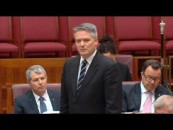What do the Greens, Nick Xenophon Team and One Nation have in common with Hillary Clinton and Donald Trump? As it happens, quite a lot, and at the top of the list is their declared hatred of the free trade treaty known as the Trans Pacific Partnership (TPP).
Later this century it is likely to become clear that western civilisation has fallen into decline. When historians look for an event that signifies the turning point from progress to paralysis, rejection of the TPP may well be that event.
The TPP is about trade; as in facilitating more of it. It will allow Australian producers to sell more dairy products, wine, steel and automotive parts at better prices. Nick Xenophon has said he supports each of these producers, yet he opposes the TPP. Sugar, beef and wheat producers will also benefit, but somehow the One Nation senators of Queensland, New South Wales and Western Australia still oppose the deal.
The TPP is also unashamedly about empire. It is a plan orchestrated by the leading countries of the free world that are not yet drowning in a culture of entitlement, including Australia and New Zealand, the US and Canada, Japan and Singapore. Together we represent an empire of liberal democracy which has allowed its people to build great wealth and, through the example it has provided to poor countries, helped pull a billion people out of extreme poverty.
Cement empire
The TPP would serve to cement this empire in the face of the bureaucratic behemoth of China. And it would further enrich our liberal democratic empire, so that China’s only option to emulate our strength would be to become more like us.
The Greens, Nick Xenophon Team, One Nation, Clinton and Trump each have a pathological fear of China, and yet they oppose the TPP that excludes China. Chinese Communist Party leaders must be chuckling in their chow mein.
The opponents of the TPP are willing to throw farmers, miners, manufacturers and workers under a bus – just to pander to a rabble of anti-everything voters. And they are a weird, eclectic rabble.
The TPP is a thick wad of paper, yet they want it to be even thicker. They want the TPP to add some magical rules to stop countries from printing more money so as to devalue their own currencies. Some of them want it to morph into a deal to save the world from climate change.
Imperfect but beneficial
They want the TPP to force Vietnamese bosses to provide first-world pay and conditions to their workers – a recipe for impoverishing an already poor country.
They want to reject the TPP because its “country-of-origin” rules aren’t mean enough to non‑member countries like China, even though rejecting the TPP would be a massive free-kick for China.
They want to reject the TPP because it obliges the government to choose the bidder offering the best value for money in many of its purchase decisions. This would save taxpayers a lot of money, but the rabble doesn’t care – probably because they don’t pay tax.
The rabble wants to reject the TPP because it requires member countries to enforce royalty payments when using intellectual property from another member country. While it can be argued the new intellectual property protections are excessive, the rabble want to decimate intellectual property protections, somehow assuming new medicines will still be invented even though they can be immediately copied and are therefore unprofitable.
Finally, the rabble object to the TPP because it requires member countries to impose the same laws on foreign investors as are imposed on domestic investors, protects foreign investors from an uncompensated seizure of their property or a denial of justice, and allows foreign investors to complain if this is not the case. This helps prevent the promulgation of arbitrary regulations, and is a requirement that Australia currently meets anyway, so it would do no harm in Australia. However it would certainly help Australians investing overseas.
The TPP isn’t perfect. We’d get an even bigger boost if we simply abolished tariffs on imports from all countries, or if we achieved a deal covering more countries. But there is no doubt the TPP offers net benefits for Australia. Its adoption in both Australia and the US should be a no-brainer. Unfortunately, the decision is in the hands of no-brainers.
David Leyonhjelm is a senator for the Liberal Democrats
First published in the Australian Financial Review









